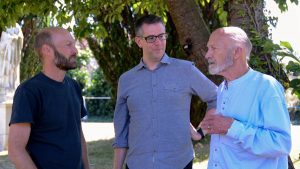Assessing the Paris Agreement

The recent Paris Agreement on climate change was hailed world wide as a huge step forward in terms of care of the earth into the future. Catherine Devitt, environmental justice officer with the Jesuit Centre for Faith and Justice has been assessing the agreement. She notes that in the closing day of the Climate Summit, United Nations Secretary General Ban Ki-moon spoke bluntly to the assembled media telling them, “I have been attending many difficult multilateral negotiations, but by any standard, this negotiation is most complicated, most difficult, but most important for humanity.” This statement, she says, reflects the weight of expectations placed on the Climate Summit.
Catherine notes that for many the Paris Agreement was a monumental success, reflecting a universal, explicit acknowledgement among the nations of the world, that climate change is a serious issue requiring urgent action. However, she also believes that while long on ambition, the agreement falls short on steps for concrete action. Looking firstly at the positive outcomes she welcomes:
• An explicit acknowledgement by 195 countries that climate change is a serious threat;
• An overall aim to limit global temperature rise to 1.5˚C above pre-industrial levels;
• Inclusion of a legally binding five year review process of national emission plans, supported by a transparent monitoring system;
• Continued and sustained commitment to financing mitigation and adaptation initiatives in developing countries and countries hardest hit by climate change;
• The allocation of responsibility to developed nations to “take the lead” on reducing greenhouse gas emissions.
She concludes that overall, “The Paris Agreement provides the impetus for more ambitious, progressive change.” She is cognisant however of where the agreement disappoints:
• The Agreement does not include any reference to leaving fossil fuels in the ground;
• No specific date is set for a peak in global greenhouse gas emissions;
• The Agreement does not include emissions from global shipping and aviation;
• Vague references are made to technologies and actions which may pave the way for false solutions with potentially harmful social and ecological implications.
Outside of the Paris Agreement Catherine believes that much hope lies in the climate action movement, a growing social phenomenon which now has considerable reach and is no longer confined to just environmentalists but encompasses a much broader civil society base. This reach may echo the beginnings of the “ecological conversion” that Pope Francis calls for in Laudato Si’ (LS. 217) she says. Pope Francis also calls for “a new dialogue about how we are shaping the future of our planet… a conversation which includes everyone… a new and universal solidarity” (LS. 14).
In going forward Catherine notes that whilst the Agreement may be weak on certain aspects it now provides a vehicle in which civil society can hold governments accountable to their promises, bridging any gap between ambition and action. “This will certainly be the case in Ireland, where emissions are on the rise, and we are on track to miss our 2020 targets,” she concludes.














